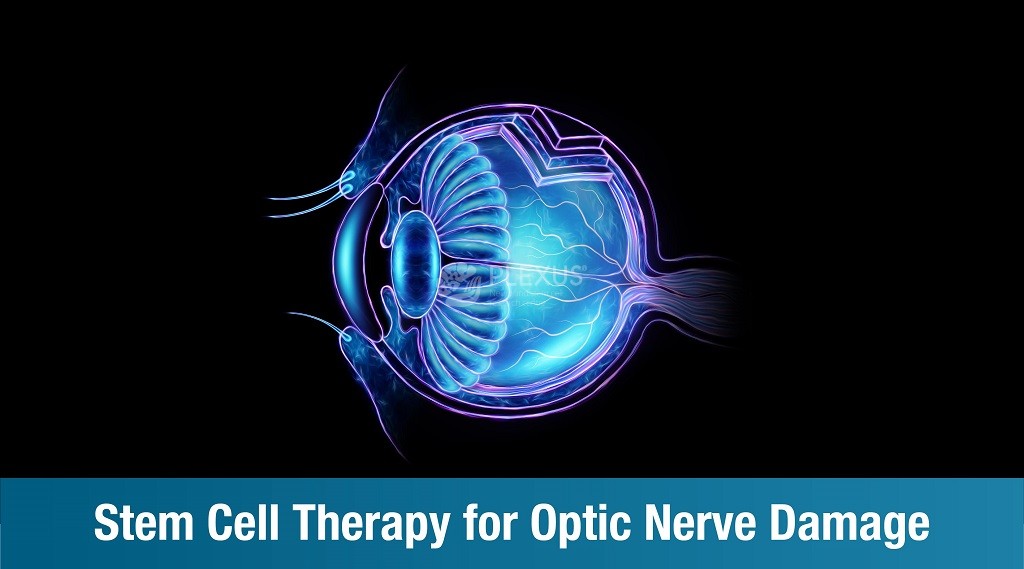
In the recent decades, cell therapy for optic nerve damage has gained tremendous ground. Injected cells can rejuvenate and/or replenish damaged optic nerve cells, slowing down the rate of progression of the condition (causing the damage), and improving vision and quality of life.
In this article, we’ll look at optic nerve damage in detail, understand its causes and symptoms, and explore the potential benefits of cell therapy for optic nerve damage.
What is Optic Nerve Damage?
Optic nerve damage refers to degeneration or injury of the optic nerve typically resulting in partial or complete blindness. inflicted on the optic nerve. T
What Causes Optic Nerve Damage or Atrophy?
Common Causes Include:
The following have been identified as the typical causes of optic nerve damage:
Compressive Lesions: Tumors or other growths near the optic nerve exert pressure and may damage it. A common example of such a lesion is a pituitary tumor.
Hereditary Conditions: Certain types of genetic conditions, such as Leber’s hereditary optic neuropathy (LHON) can damage the optic nerve.
Trauma: Any kind of physical trauma to the eye or head can disrupt blood supply to the optic nerve or cause damage to it.
Medications: Certain medications can harm the optic nerve.
Lifestyle: Tobacco and alcohol can cause damage to the optic nerve.
Glaucoma: Elevated pressure damages the optic nerve over time.
Optic Neuropathy: Optic neuropathy involves damage to the optic nerve, and may be caused by inflammation, toxins, trauma, and other factors.
Ischemic Optic Neuropathy: Ischemic optic neuropathy is caused by insufficient blood flow to the optic nerve.
Optic Neuritis: Optic neuritis is inflammation of the optic nerve, commonly associated with multiple sclerosis (MS).
Symptoms to Watch For
The following are the most common symptoms of optic nerve damage:
- Flashing or flickering of lights when moving eyes
- Recurrent loss of vision in one or both eyes
- Gradual or sudden vision loss
- Loss of peripheral vision
- Pain (in the face, eye socket, and/or inside the eye (symptom of optic neuritis)
- Less vivid vision
- Decreased color vision
- Abnormal pupillary responses.
- Changes in the appearance of the optic disc
Can the Optic Nerve Regenerate?
The most common practice to restrict damage to the optic nerve is by preventing/slowing down further damage to the optic nerve is by controlling blood pressure, and symptoms management.
Today, mesenchymal cells (MSCs) or neural cells are being used to manage the condition. Injected into the retrobulbar region of the eye, these progenitor cells can activate neurofilament genes, rejuvenate damaged nerve cells, and also secrete neurotrophic factors that enable the formation of neuronal cells.
Regenerative Cell Therapy for Optic Nerve Damage
It must be mentioned here that cell therapy can slow down or prevent further damage to the optic nerve only if the condition is detected in the early stages. Cell therapy must be considered as a preventive rather than a cure. While cells have the power to regenerate damaged cells and restore vision, the results will vary on a case to case basis.
Benefits of Cell Therapy:
Promotes Nerve Regeneration: Encourages repair and regrowth of damaged optic nerve fibers.
Reduces Inflammation: Helps control immune responses that may contribute to further nerve damage.
Improves Visual Function: Can lead to enhancements in visual acuity and field in some patients.
Slows Disease Progression: May help halt or slow down further deterioration of the optic nerve.
Supports Cellular Repair: Replaces or supports damaged retinal or glial cells for better optic health.
Minimally Invasive Option: Offers a potential alternative to invasive surgical interventions.
Treatment Process at Plexus
Why Choose Plexus:
Plexus is India’s first ISO-certified cell research centre. We offer customised regenerative rehabilitation programmes for several neurological conditions.
Harnessing your body’s self-healing capabilities, autologous mesenchymal cells are taken from your body, cultured in a laboratory, and injected back into your body. Risk-free and pain-free, cell therapy at Plexus has improved the quality of life of patients with optic nerve damage.
Connect with us to know more about our regenerative rehabilitation.
WhatsApp +91 89048 42087
Call +91 78159 64668 (Hyderabad) | +91 82299 99888 (Bangalore)
FAQs
Can optic nerve damage be reversed with therapy?
While complete reversal is rare, therapy—especially regenerative options like cell therapy—can improve function and slow progression.
What is the most effective treatment for optic nerve atrophy in India?
Cell-based therapy, combined with neuro-rehabilitation, is emerging as one of the most promising treatments for optic nerve atrophy in India.
How does Plexus use cells for optic nerve regeneration?
Plexus uses advanced cell therapy to promote nerve repair, reduce inflammation, and support regeneration in damaged optic tissues.
Is cell-based therapy safe for treating vision loss?
Yes, when administered by trained experts, cell-based therapy is a safe and minimally invasive approach for vision-related conditions.
How long does it take to see improvement after the treatment?
Most patients begin to notice gradual improvement within a few weeks to months, depending on the extent of damage and therapy response.










